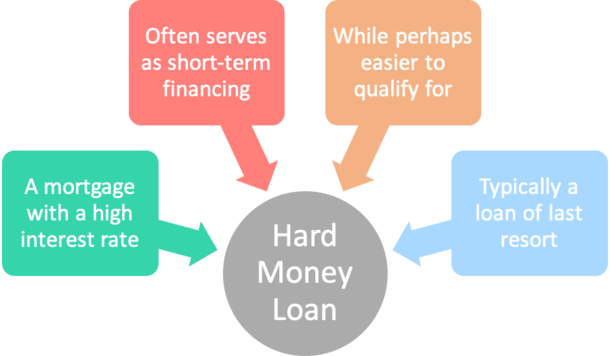Exactly How a Hard Money Lending Functions: a Comprehensive Guide for Borrowers
Hard money finances present a special financing alternative that leverages property as collateral, appealing particularly to those that need quick access to capital. Understanding the mechanics of these fundings is essential for debtors, as the procedure varies substantially from conventional loaning techniques. From identifying a suitable lending institution to browsing the application procedure, each action lugs its very own nuances and ramifications. As with any kind of economic decision, there are both advantages and potential pitfalls that should be considered prior to proceeding. Checking out these elements can brighten whether this financing path straightens with your financial objectives.
Recognizing Hard Money Loans
Comprehending difficult cash loans is vital for both actual estate investors and debtors seeking fast funding. Difficult cash fundings are safeguarded by real estate, with the residential or commercial property itself offering as security.
The regards to hard money loans are normally short-term, varying from a couple of months to a couple of years, and they frequently come with higher rate of interest contrasted to standard financings. This costs mirrors the greater threat lenders think and the expedited nature of the finance procedure. Investors regularly make use of tough cash lendings for fix-and-flip tasks, permitting them to obtain, restore, and sell properties quickly for profit.
Additionally, the underwriting standards for difficult cash financings are generally much less rigorous, promoting much faster authorizations. However, customers have to remain vigilant about the repayment terms and potential charges for default, as these financings can cause considerable economic consequences otherwise managed properly. Recognizing these characteristics is essential for informed decision-making in actual estate financing.
The Application Process
Using for a tough cash lending entails a streamlined procedure that can be completed reasonably rapidly contrasted to typical lending techniques. The first action is to identify a credible difficult cash loan provider that concentrates on the type of home financing you call for. Consumers typically begin by submitting a financing application, which includes crucial information concerning the residential property, the desired use the funds, and their financial standing.
Once submitted, the lending institution will conduct a residential property evaluation to determine its market value and evaluate the threat entailed. Unlike conventional loans that heavily evaluate credit rating, difficult cash lenders primarily focus on the security value. If the customer's credit background is less than outstanding., this implies that residential properties with solid equity can safeguard financing also.
After the appraisal, the lender will certainly offer a lending proposal, detailing the terms, interest prices, and any type of extra fees. Upon approval, borrowers will certainly require to provide necessary documents, such as proof of identity and possession of the building. The last action is the closing procedure, where the funds are disbursed, enabling borrowers to make use of the resources for their intended objective.
Benefits of Tough Cash Loans

In addition, tough money loans are primarily based upon the worth of the security rather than the customer's creditworthiness. This can be particularly useful for those with less-than-perfect credit or for financiers aiming to take advantage of homes with equity. The adaptable underwriting criteria permit debtors to accessibility funds that might otherwise be unavailable with standard financing channels.
In addition, difficult cash loan providers often have try this web-site an even more streamlined approval process, which can be beneficial genuine estate capitalists who require quick access to funding for residential or commercial property acquisitions or renovations. This dexterity can bring about a competitive edge in fast-paced markets.
Lastly, difficult cash financings can provide a useful device for borrowers seeking to finance special projects that do not fit standard financing requirements, thus increasing their financial investment possibility.
Prospective Threats and Drawbacks
While difficult cash lendings can sites be an attractive option for some borrowers, they are not without their potential threats and drawbacks. Among one of the most substantial issues is the high rates of interest linked with these lendings, which can commonly surpass those of standard funding. Hard Money Loans In Georgia. This elevated expense can cause significant monetary stress, specifically if the customer deals with unexpected obstacles in paying off the loan
Additionally, difficult money loans commonly feature much shorter settlement terms, frequently ranging from one to 3 years. This minimal duration can produce stress for borrowers to offer or re-finance their residential property rapidly, which might not always align with market conditions. Moreover, the dependence on the residential property's worth instead than the borrower's credit reliability implies that variations in the genuine estate market can significantly influence the funding's feasibility.

Another notable danger is the lack of regulative oversight that controls difficult cash financing. This can cause aggressive lending practices or undesirable terms that are not transparent to the borrower. Overall, while tough money car loans can provide quick access to funds, it is important for borrowers to completely examine these threats and consider their lasting economic implications prior to proceeding.
Contrasting Tough Cash to Traditional Financings
When assessing financing alternatives, it is vital to understand the key differences in between hard money fundings and standard fundings. Difficult money fundings are usually protected by property and are moneyed by private capitalists or business. They typically prioritize the value of the security instead of the customer's creditworthiness. Conventional fundings, on the other hand, are usually released by banks or credit report unions and depend greatly on the customer's credit rating, earnings, and monetary history.
Passion rates on hard money loans are normally greater, mirroring the raised risk for lending institutions - Hard Money Loans In Georgia. They provide quicker authorization procedures and less rigid qualification criteria, making them appealing for those needing prompt financing, such as real estate financiers. Typical car loans, while slower to refine, often featured lower interest prices and longer repayment terms, making them much more ideal for consumers searching for steady, long-lasting funding
Ultimately, the choice in between tough cash and typical lendings depends on specific scenarios, consisting of necessity, credit rating status, and the specific economic objectives of the debtor. Comprehending these distinctions can help assist debtors in choosing the most ideal financing option for their requirements.

Conclusion
In summary, tough cash fundings give a practical financing option for debtors calling for quick access to funds, especially when typical financing opportunities are inaccessible. Inevitably, careful examination of this funding method in comparison to conventional finances is crucial for educated decision-making.
Understanding hard money loans is necessary for both actual estate capitalists and consumers looking for quick resources.The terms of tough cash loans are usually temporary, varying from a couple of months to a couple of years, and they commonly come with higher rate of interest rates compared to conventional lendings. Unlike typical lendings that may take weeks or months to procedure, tough cash loans can commonly be protected in a matter of days, enabling customers to take advantage of on time-sensitive investment chances.
When examining funding choices, it is essential to recognize the crucial distinctions in between tough money car loans and conventional loans.In recap, tough money lendings offer a feasible financing option for consumers needing quick accessibility to funds, particularly when typical loaning avenues are not available.